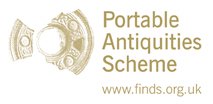Server check!
You are on the training database
Help Record Our Past for the Future
Responsible metal-detecting can help us understand the past. Often metal-detected finds will be the only evidence for human activity, but once these have been removed from the ground (unless properly recorded) that evidence is lost. Finders therefore should follow the Code of Practice for Responsible Metal Detecting in England and Wales, and record their finds with the Portable Antiquities Scheme (PAS).
The PAS records finds discovered by the public to advance knowledge of the archaeology of England and Wales. This data is available through its online database. Anyone can access this information, but precise findspot information is only available to legitimate researchers.
The Scheme consists of 40 locally based Finds Liaison Officers (FLO) covering the whole of England and Wales. Their job is to liaise with finders and record their finds. Up to date details of all PAS staff.
FLOs are interested in seeing all archaeological objects and coins that you have found, but need to be selective in what they record. Finds will be borrowed from you, but will be returned once they have been identified and recorded. It is important that you supply a precise National Grid Reference (at least to 6-figures) for all finds, as without a location, they have little archaeological value.
Under the Treasure Act 1996, finders must by law report finds of potential Treasure. It is normally the case that such finds are reported to the relevant FLO, who is able to provide further advice and guidance on the process.
The Act allows a national or local museum to acquire Treasure for public benefit. If this happens a reward is paid, which is normally shared equally between the finder and landowner. Rewards are set at the full market value, determined by the Secretary of State who is advised by an independent panel, the Treasure Valuation Committee. Finders or landowners sometimes do not claim their reward, thereby enabling museums to acquire finds at reduced or no cost.
It is the law that archaeological finds cannot leave the United Kingdom without an export licence: this is required for all finds that are over 50 years old. It is the exporter's obligation to apply for a licence, and it is advised that they use the PAS database reference for all finds in export applications.
The PAS is managed by the British Museum at Portable Antiquities & Treasure, British Museum, London, WC1B 3DG. Tel: 0207 323 8611. Email: info@finds.org.uk.
This information is available in Dutch, English, French, German, Italian, Polish.


